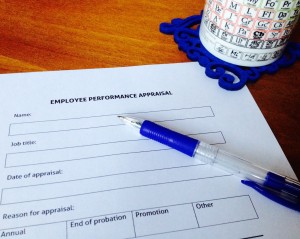 For employees the annual appraisal can be a workplace evil or a career boost. Rosalind Davies weighs up the value of a DIY evaluation for the freelancer.
For employees the annual appraisal can be a workplace evil or a career boost. Rosalind Davies weighs up the value of a DIY evaluation for the freelancer.
You’ve just made a purchase online or spoken to customer services on the phone and it’s not long before the feedback email appears in your inbox: “Your views are really important to us. They help us understand where we need to improve but also give us the opportunity to share your compliments with our staff. We would like you to tell us what we’ve done well and what we could have done better.”
What do you do with these requests? You might welcome the opportunity to get something off your chest or you may regard it as spam. Your response to such a follow-up may bear some scrutiny in the context of your own business practices. Do you regard feedback as important or would you rather move swiftly on without a backwards glance?
Time for a freelance performance review?
Many organisations are committed to the annual performance appraisal or review of their staff as a process for an individual employee to engage in a dialogue about their work. It is usually carried out by a line manager to assess recent performance and focus on future objectives, opportunities and resources needed.
For employees the performance review can be a source of anxiety or a chore that requires uncomfortable introspection. More positively, it should be an opportunity to discuss your development and the support that you need to carry out your role. At best it should be a dedicated time for reflection and constructive analysis. Acknowledgement of achievements and hard work that may go unsaid most of the time, will hopefully surface during an appraisal, and tensions around office politics or internal processes might be aired safely.
For the self-employed person these processes for reflection probably don’t exist. You might have happily ripped up the staff handbook and pushed your annual travelcard to the back of a drawer, but you will also have lost any mechanism to reflect on the work that you do, your objectives and weaknesses, and the access to someone else’s view of your skills and achievements.
The power of praise
“I wanted to acknowledge this year in particular how much I have admired what you have achieved,” was the opening line of a letter I was delighted to receive a few years ago. The writer went on to comment on my work ethic, self-motivation, determination and ability to multi-task. It sounds like an easy ego boost, but, unexpected and unasked for as it was, it meant a great deal to me that someone else had realised that without a line manager, compliments, let alone evaluations, were likely to be thin on the ground.
My considerate friend, a manager himself, set me to thinking about the importance of the appraisal process. The challenge, for a freelance worker, is how to build some reflection and review into your working year. You may be fortunate enough to have clients who take a holistic view of their working relationship with you, who take the time to thank you for a good job or give feedback on areas for development. If, however, your project managers or desk editors are entirely task-driven, simply feeding jobs to you and receiving them back again with little other communication, then you might find one of these DIY techniques for initiating a performance appraisal helpful.
Ask for feedback
If your only measure of success is repeat business, it may be time for you to ask for feedback. A long-standing relationship with a client is good news, but constructive feedback could hold so much more for personal and professional development. You could ask for a review at the end of a ‘probationary’ period or as an established supplier. If you have completed a one-off assignment, it’s good practice to ask for a testimonial. A request for “a couple of sentences about the quality of service I provided” could provide you with an opportunity for learning and development, as well as something for your CV or website. More importantly, if you’re feeling isolated, asking for feedback is a way of initiating a conversation about your service and skills.
Ask a friend
Invite someone close to you to go through an appraisal process with you. They may not know the details of your day-to-day work, but ask them to reflect on your motivation levels, perseverance or commitment to clients. In a corporate setting many employers use a questionnaire that both parties complete in advance of the review. This might be a good way to start for a freelancer, too. Include questions that push you to be specific in your analysis, such as:
- Have I achieved my objectives this year? What have I done particularly well? What examples of my work demonstrate this?
- What have I done that has been less successful or enjoyable this year? What examples of my work demonstrate this? Why has this area of work been less successful or enjoyable?
- What are the main skill and knowledge development needs that I have? How could I fill my development gaps/learning needs?
Whatever you learn through this process – positive or negative – introducing a version of a performance review into your working life will help you to focus on the future and plan for the continued development of a portfolio of clients and projects.
Rosalind Davies is a copy-editor and offers wider communications services as Ros Davies Communications. She is active on Facebook and tweets as @drRosDavies.
Proofread by Patric Toms.
The views expressed here do not necessarily reflect those of the CIEP.

